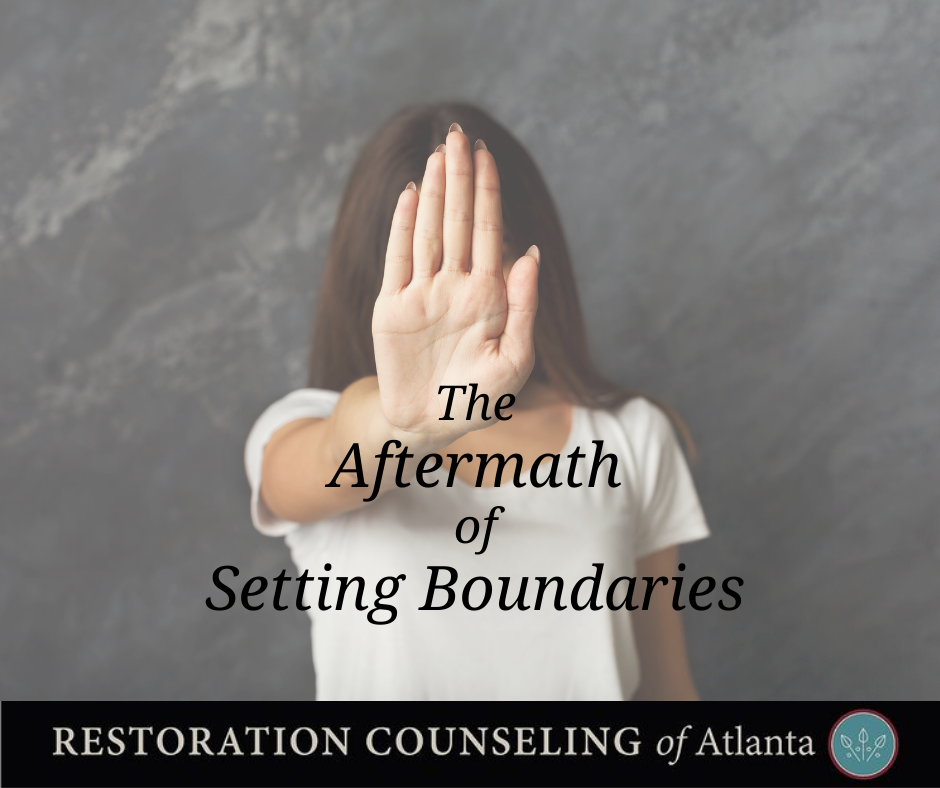“Boundaries” like “self-care” is kind of a buzzword, isn’t it? If you’ve been to therapy or on the internet (aka everyone), you’ve likely heard this word being thrown around. Let’s start by defining boundaries. Boundaries are what set me apart as an individual from you as an individual. Boundaries show that each of us is an autonomous individual with our own feelings, thoughts, behavior, and power. Specifically, boundaries are the guidelines or limits that we create for ourselves to maintain our individuality and individual needs.
We were all created as both an individual and a person in community/relationships. Boundaries are necessary when a relationship infringes on our individual needs in an unhealthy manner. There is so much great information that is easily accessible about the different types of boundaries and how to set them. I don’t think I need to add to that discussion. I want to discuss a part of boundary setting that is less talked about…
Oftentimes, the people who need to set boundaries tend to desire to please others. Or at least they desire to please a particular person. Maybe it’s a caregiver who taught you that you need to please them. Perhaps it’s a friend who tends to dominate the relationship. Maybe it’s a sibling who tries to control things. Another hallmark of difficulty in setting boundaries is a fear of confrontation. Maybe you tend to shy away from big or “negative” emotions. Maybe the particular person you have a hard time setting boundaries with tends to have big reactions.
There is a process that takes place when you set boundaries, and it goes something like this:
- I set a boundary
- The person has a reaction to my boundary
- I react to their reaction
No matter what your particular boundary-setting struggle may be, I find that often the thing that stops someone from setting a boundary is dealing with the aftermath; that is, either dealing with the person’s reaction to your boundary or dealing with your feelings about their reaction.
Let me start by saying that setting a boundary and dealing with the aftermath IS difficult. When we are in a relationship with people, we create a sort of dance with them. We both know the moves of the dance so no one is tripping or falling. When you set a boundary with someone, it’s like all of a sudden, you turn left instead of turning right, and you trip and fall over each other. It takes time for you to learn the new dance together, and it probably won’t happen without some falls and bruises. The allegorical falls and bruises are what is scary and often what stops us from setting a boundary.
Knowing that it is difficult, I have some tips for managing your reaction to another person’s reaction to your boundary-setting.
- Anticipate their reaction. It can be tricky to anticipate someone’s reaction because you don’t know how they’ll react for sure. But there are often patterns that can give you a clue as to how they will react.
- Practice your response. The big struggle is that their reaction may cause you to back down on your boundary. To help with this, practice how you might respond to their reaction to you. Responses may include “I know this is different than how it’s normally been” or “Thank you for sharing how you feel with me, I’ll take it into consideration.”
- Expect that it will be difficult. You may have some strong emotions to their reaction. Expect that you might second-guess yourself.
- Remember your “why.” To manage the difficulty of it, remember why you created the boundary in the first place. My guess is that it wasn’t an overnight decision, and you didn’t make the decision lightly.
- Manage your thought world. Thoughts tend to be automatic and you might notice those thoughts of second-guessing yourself or thinking that setting a boundary is too hard. When you notice those thoughts creeping in, you can remind yourself again of your “why.”
Setting boundaries sounds really nice on paper, but it’s very difficult work with lots of nuances. There is no “one-size-fits-all” approach to boundary-setting. But I hope that this article empowers you to set boundaries where necessary. And as always, don’t hesitate to reach out to us if you’d like to talk to an experienced professional about boundary-setting in your own life.
 Written by Ashley Skinner, MA, APC
Written by Ashley Skinner, MA, APC
Woodstock Location
ashley@restorationcounselingatl.com ext 119
Ashley takes a multi-theory approach to psychotherapy. This allows her to take the whole person into account – mind, body, and soul. Her emphasis is on Cognitive-Behavioral Therapy, Narrative Therapy, and mindfulness techniques. She works with individuals ages 18 and up, dealing with anxiety and/or depression, postpartum anxiety and/or depression, trauma, abuse, life transitions, self-esteem issues, and grief.

